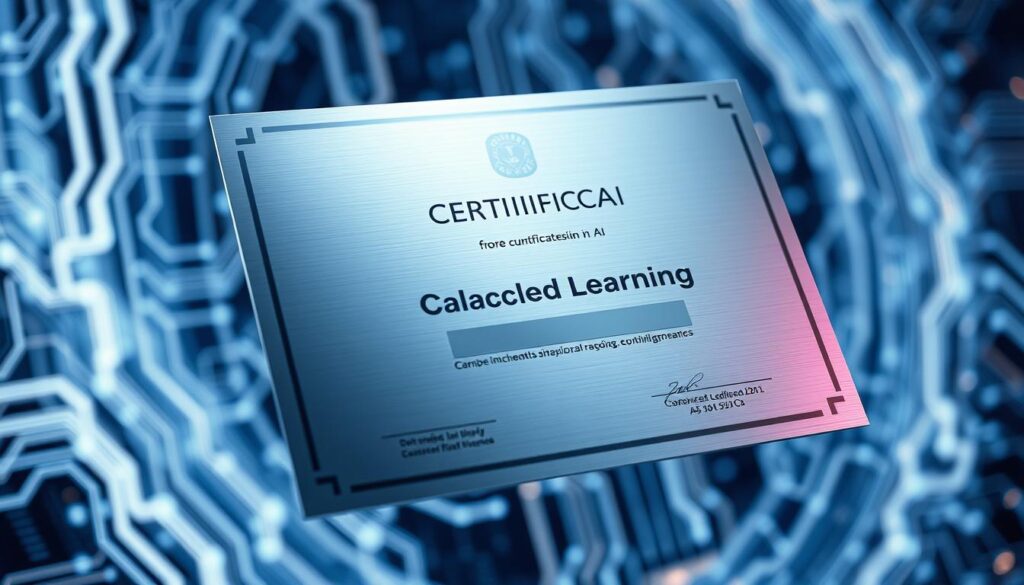The job market is witnessing an unprecedented surge in demand for professionals skilled in Artificial Intelligence (AI) and Machine Learning. With technological advancements on the rise, companies are looking for individuals who can harness the power of AI to drive innovation and efficiency.
As the industry evolves, having an online ai certification can be a significant career booster, validating one’s expertise and commitment to staying ahead of the curve. It’s not just about being competitive; it’s about being relevant in a rapidly changing job landscape.
Key Takeaways
- Acquire skills in AI to stay relevant in the job market.
- Certification can significantly boost career prospects.
- Validate your expertise with online certifications.
- Stay ahead of the curve with the latest technologies.
- Enhance your career with specialized knowledge in AI.
The Growing Importance of AI Skills in Today’s Job Market
In the modern job landscape, skills in AI and ML are not just an asset but a necessity for career advancement. The rapid evolution of technology has led to an increased demand for professionals who can leverage AI and ML to drive innovation and efficiency.
The Expanding Role of AI Across Industries
AI is no longer confined to the tech industry; it’s now a critical component across various sectors, including healthcare, finance, and manufacturing. Industries are adopting AI to automate processes, enhance customer experiences, and gain a competitive edge. For instance, in healthcare, AI is used for predictive analytics and personalized medicine, while in finance, it’s utilized for risk management and fraud detection.
How Certification Validates Your Expertise
Obtaining a certification in AI or ML validates an individual’s expertise and commitment to staying updated with the latest technologies. Certified professionals demonstrate a higher level of competence, which is crucial in a field that is constantly evolving. Certification programs, such as those offering accredited machine learning programs, ensure that professionals have the necessary skills to tackle complex challenges.
Employer Perspectives on Certified Professionals
Employers highly value certifications when hiring for AI and ML roles. A certification is seen as a benchmark of expertise, indicating that the individual has undergone rigorous training and has a deep understanding of AI principles and applications. Certified professionals are more likely to be considered for senior roles and are often given preference in the hiring process.
| Industry | AI Application | Certification Benefit |
|---|---|---|
| Healthcare | Predictive Analytics | Enhanced Patient Care |
| Finance | Risk Management | Reduced Fraud |
| Manufacturing | Process Automation | Increased Efficiency |

Top AI and Machine Learning Certification Options
With AI and machine learning at the forefront of technological advancements, certifications in these fields are becoming increasingly valuable. Professionals looking to advance their careers can choose from a variety of certification programs offered by prestigious academic institutions and industry leaders.
University and Academic Certifications
Top universities are now offering certification programs in AI and machine learning, catering to the growing demand for skilled professionals. These programs are designed to provide a comprehensive understanding of the subject.
Stanford’s Machine Learning Professional Program
Stanford’s program covers a broad range of topics in machine learning, including supervised and unsupervised learning, and deep learning. It is designed for professionals who want to gain a deeper understanding of machine learning algorithms and their applications.
MIT Professional Certificate in Machine Learning
MIT’s Professional Certificate in Machine Learning is designed to provide a thorough understanding of machine learning concepts and their practical applications. The program covers topics such as machine learning fundamentals, graphical models, and deep learning.
Industry Platform Certifications
Industry leaders like Google, IBM, and Microsoft offer certification programs that are tailored to their respective platforms. These certifications are highly valued in the industry as they demonstrate a professional’s ability to work with specific technologies.
Google AI Certification Programs
Google’s AI certification programs are designed to validate a professional’s skills in using Google’s AI technologies. The programs cover a range of topics, including machine learning and deep learning.
IBM AI Engineering Professional Certificate
IBM’s AI Engineering Professional Certificate is designed to provide a comprehensive understanding of AI and machine learning concepts, as well as the skills to apply them using IBM technologies.
Microsoft Azure AI Fundamentals
Microsoft Azure AI Fundamentals certification is designed for professionals who want to demonstrate their understanding of AI and machine learning concepts on the Azure platform.
| Certification | Institution/Platform | Focus Area |
|---|---|---|
| Machine Learning Professional Program | Stanford | Machine Learning |
| Professional Certificate in Machine Learning | MIT | Machine Learning |
| AI Certification Programs | AI and Machine Learning | |
| AI Engineering Professional Certificate | IBM | AI Engineering |
| Azure AI Fundamentals | Microsoft | AI on Azure |
Specialized Technical Certifications
Specialized technical certifications like TensorFlow Developer Certificate and AWS Machine Learning Specialty are designed for professionals who want to demonstrate their expertise in specific technologies.
TensorFlow Developer Certificate
The TensorFlow Developer Certificate is designed to validate a professional’s skills in using TensorFlow for machine learning and deep learning applications.
AWS Machine Learning Specialty
AWS Machine Learning Specialty certification is designed for professionals who want to demonstrate their ability to design, implement, and maintain machine learning solutions on AWS.
How to Choose the Right AI Certification for Your Career Goals
The process of choosing an AI certification that fits your career goals involves several key considerations. With the increasing demand for AI professionals, numerous certifications have emerged, making it crucial to select one that aligns with your career aspirations. Advanced machine learning training is a critical aspect to look for in a certification program.
Assessing Your Current Technical Background
Before choosing an AI certification, it’s essential to assess your current technical background. Consider your experience with programming languages, data structures, and software development methodologies. This self-assessment will help you identify the type of certification that would be most beneficial for your career advancement.
Identifying Your Career Trajectory
Identifying your desired career trajectory is vital in selecting the right AI certification. Are you looking to transition into a new role or advance in your current position? Different certifications cater to different career paths, so it’s crucial to choose one that aligns with your goals. Consider the skills required for your desired role and look for certifications that cover those areas, such as advanced machine learning training.
Evaluating Certification ROI and Recognition
When evaluating AI certifications, consider the return on investment (ROI) and recognition within the industry. Look for certifications that are well-recognized and respected by employers. Also, consider the cost of the certification program and the potential salary increase it could lead to. A certification that offers advanced machine learning training can significantly enhance your career prospects.
Preparing for AI and Machine Learning Certification: Step-by-Step Guide
Preparing for AI and machine learning certification involves several key steps that ensure you’re well-prepared for the exam. The journey to becoming certified requires a structured approach, starting with understanding the exam format and content.
Developing a Structured Study Plan
A well-structured study plan is crucial for effective preparation. Begin by assessing your current knowledge level in AI and machine learning, identifying areas that require improvement. Create a timeline leading up to the exam date, allocating sufficient time for each topic. Utilize a study planner or calendar to stay organized and on track.
Essential Learning Resources and Materials
Gathering the right study materials is vital. Reliable textbooks, online courses, and practice exams are essential resources. Consider enrolling in AI certification courses that offer comprehensive coverage of the exam syllabus. Online platforms like Coursera, edX, and Udemy provide a wide range of courses tailored to different certification exams.
Practical Projects to Reinforce Learning
Applying theoretical knowledge to practical projects is a crucial step. Engage in projects that involve real-world AI and machine learning applications, such as image recognition, natural language processing, or predictive analytics. This hands-on experience will reinforce your understanding and improve your problem-solving skills.
“The best way to learn is by doing.” – Richard Brinsley Sheridan
Exam Preparation Strategies and Tips
As the exam approaches, focus on strategies that enhance your performance. Practice with sample questions and timed exams to simulate the actual test experience. Review your weak areas thoroughly and develop a pre-exam routine to help manage stress and ensure you’re well-prepared on the day of the exam.
| Preparation Step | Description | Timeline |
|---|---|---|
| Assess Current Knowledge | Evaluate your understanding of AI and machine learning concepts. | Week 1-2 |
| Structured Study Plan | Create a detailed study schedule. | Week 3-4 |
| Practical Projects | Apply knowledge to real-world projects. | Week 5-8 |
| Exam Practice | Use sample questions and timed exams. | Week 9-10 |
Career Advancement After Obtaining AI Certification
AI certification is not just a credential; it’s a key to unlocking new career opportunities in the field of artificial intelligence. With the increasing demand for AI professionals across various industries, having a certification can significantly enhance your career prospects.
Certified AI professionals can expect a wide range of career opportunities. The certification validates their expertise and readiness to take on complex projects, making them more attractive to potential employers.
In-Demand Roles
Certified AI professionals are in high demand for roles such as AI Engineer, Machine Learning Engineer, Data Scientist, and AI Research Scientist. These roles are critical in driving innovation and implementing AI solutions across industries.
- AI Engineer: Designs and develops AI models and systems.
- Machine Learning Engineer: Implements machine learning algorithms and models.
- Data Scientist: Analyzes complex data to inform business decisions.
- AI Research Scientist: Explores new AI techniques and applications.
Salary Expectations
Salary expectations for certified AI professionals vary across different industries. The table below provides an overview of average salary ranges in the United States.
| Industry | Average Salary Range |
|---|---|
| Finance | $120,000 – $180,000 |
| Healthcare | $110,000 – $160,000 |
| Technology | $130,000 – $200,000 |
These figures are based on national averages and can vary depending on factors such as location, experience, and specific employer.
Continuing Education
To maintain certification and stay updated with the latest advancements in AI, continuing education is crucial. This can involve participating in workshops, attending conferences, and pursuing advanced certifications in machine learning certification online programs.
Key areas for continuing education include:
- New AI techniques and algorithms
- Ethics and bias in AI
- Industry-specific AI applications
Conclusion
As the demand for AI and machine learning expertise continues to grow, obtaining a certification in this field can be a strategic career move. By validating your skills and knowledge, AI and machine learning certification can open up new opportunities and enhance your professional prospects.
Pursuing AI and machine learning certification demonstrates your commitment to staying ahead of the curve in a rapidly evolving technological landscape. With the right certification, you can position yourself for success in a variety of industries, from tech and healthcare to finance and education.
By investing in AI and machine learning certification, you can take the next step in your career and unlock new possibilities. Whether you’re looking to transition into a new role or advance in your current field, certification can help you achieve your goals and stay competitive in the job market.




